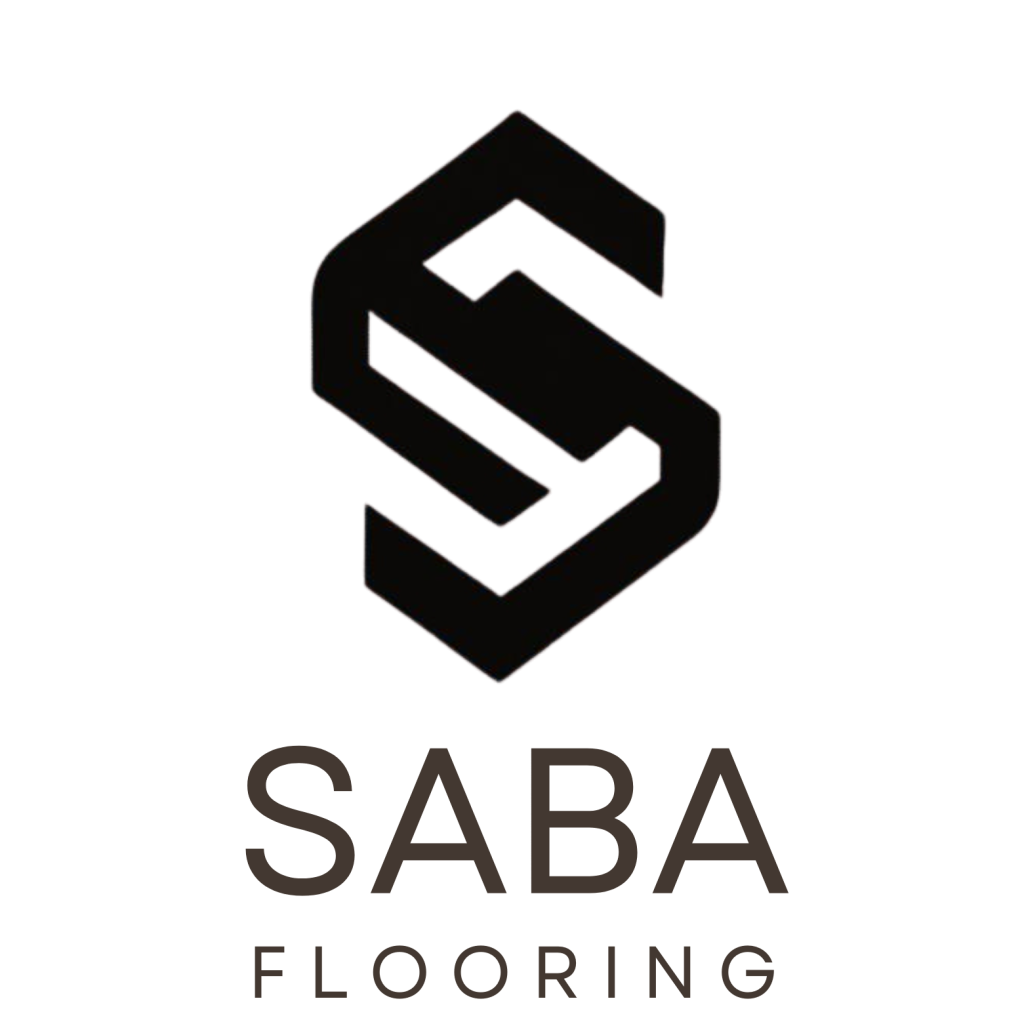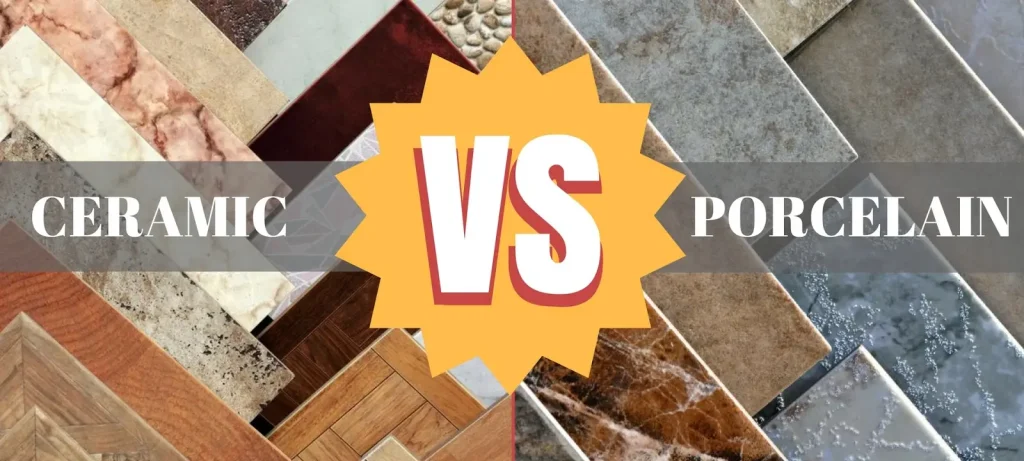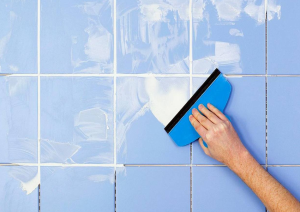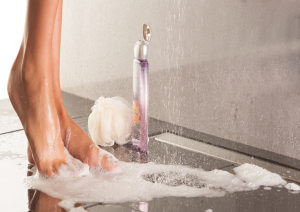Choosing the right tile for your home involves more than just picking the color and design. Different tile types come with varying properties, such as durability, water resistance, and ease of maintenance. Whether you’re tiling a bathroom, kitchen, or living area, understanding the differences between tile materials will help you select the right option for your space.
In this guide, we’ll explore the most common types of tile—including ceramic, porcelain, and natural stone—along with their pros, cons, and best uses.
We can install any model or material you have in mind for installing tiles. Just contact us first.
1. Ceramic Tile

Ceramic tile is one of the most popular and affordable tile materials. Made from natural clay that is baked at high temperatures, ceramic tiles are versatile and come in a wide variety of colors, finishes, and sizes.
Pros:
- Affordable: Ceramic tiles are generally more affordable than other tile materials, making them a budget-friendly choice.
- Wide Variety: Available in many colors, styles, and patterns, ceramic tiles can be used in both modern and traditional interiors.
- Easy to Install: Ceramic tiles are relatively easy to cut and install, making them a good option for DIY projects.
- Durable: While ceramic tiles are not as hard as porcelain, they are durable enough for low- to moderate-traffic areas like bathrooms, kitchens, and backsplashes.
Cons:
- Not as Water-Resistant: While ceramic tiles are water-resistant, they are more porous than porcelain tiles, which makes them less ideal for high-moisture areas like showers.
- Chipping Risk: The surface glaze can chip, especially in high-traffic areas, exposing the underlying clay.
- Requires Sealing: Unglazed ceramic tiles need to be sealed to protect against stains and moisture.
Best Uses:
Bathrooms, kitchens, backsplashes, low-traffic floors, and walls.
Pro Tip: If you’re installing ceramic tiles in a high-moisture area like a bathroom or kitchen, make sure the tiles are glazed for better water resistance.
2. Porcelain Tile

Porcelain tile: is a type of ceramic tile that is denser, more durable, and less porous. It is made from finer clay and baked at higher temperatures, making it stronger and more water-resistant than regular ceramic tiles.
Pros:
- Highly Durable: Porcelain tiles are extremely hard and resistant to scratches, making them ideal for high-traffic areas and commercial spaces.
- Water-Resistant: Porcelain is more water-resistant than ceramic, which makes it suitable for bathrooms, kitchens, and outdoor areas.
- Low Maintenance: Porcelain tiles are easy to clean and require little maintenance. They are also resistant to stains and moisture.
- Variety of Styles: Available in a wide range of finishes, including wood-look, stone-look, and concrete-look tiles.
Cons:
- Higher Cost: Porcelain tiles are generally more expensive than ceramic due to their durability and density.
- Difficult to Cut: The hardness of porcelain makes it more challenging to cut, requiring specialized tools such as a wet saw.
- Heavy: Porcelain tiles are heavier than ceramic tiles, which may make installation more difficult, especially on walls.
Best Uses:
Bathrooms, kitchens, high-traffic floors, outdoor patios, and commercial spaces.
Pro Tip: Porcelain is an excellent choice for outdoor use because of its low water absorption rate, which helps it withstand freezing temperatures.
3. Natural Stone Tile

Natural stone tiles include materials such as marble, granite, travertine, limestone, and slate. These tiles are cut from natural stone and offer a luxurious, timeless look. Each piece is unique due to its natural veining and color variations.
Pros:
- Unique Aesthetic: Natural stone tiles have distinct, natural beauty with unique patterns and textures that make each tile one-of-a-kind.
- High Durability: Certain stones like granite and slate are extremely durable, making them suitable for high-traffic areas.
- Adds Value: Natural stone flooring can increase the value of your home due to its high-end, luxurious appeal.
Cons:
- High Cost: Natural stone tiles are typically more expensive than ceramic or porcelain tiles due to the extraction and processing required.
- Porous: Many natural stones, such as marble and travertine, are porous and require regular sealing to prevent stains and moisture damage.
- Maintenance-Intensive: Stone tiles require ongoing maintenance, including cleaning with pH-neutral cleaners and sealing every year or two.
Best Uses:
Bathrooms, kitchens, countertops, high-traffic floors, outdoor spaces, and walls.
Pro Tip: Marble and travertine tiles are best suited for low-moisture areas, as they are more prone to staining and etching from acidic substances like citrus and vinegar.
4. Glass Tile

Glass tile is often used as an accent material due to its glossy finish and ability to reflect light, which can make a space feel brighter and more spacious. Glass tiles come in various colors and styles and are typically used for backsplashes or decorative features.
Pros:
- Non-Porous: Glass tiles are non-porous, meaning they are resistant to stains, moisture, and mold, making them ideal for kitchens and bathrooms.
- Reflective: The reflective surface of glass tiles can make a small space feel larger and more open by bouncing light around the room.
- Variety of Colors: Glass tiles come in a wide range of colors and finishes, making them perfect for creating unique, modern designs.
Cons:
- Fragile: Glass tiles are more delicate than ceramic or porcelain and can crack or chip if not installed properly.
- Higher Cost: Glass tiles tend to be more expensive than ceramic or porcelain, especially if used in large quantities.
- Difficult to Install: The transparency of glass tiles requires extra precision during installation to prevent visible adhesive marks or air bubbles.
Best Uses:
Kitchen backsplashes, bathroom accent walls, decorative features.
Pro Tip: When installing glass tiles, use a white adhesive or mortar to avoid visible shadows or marks behind the tile.
5. Cement Tile

Cement tiles are handmade and known for their vibrant colors and intricate patterns. These tiles are often used for decorative purposes and are particularly popular in kitchens and bathrooms.
Pros:
Customizable Patterns: Cement tiles are handmade and can be customized with intricate designs and bold colors, adding a unique touch to any room.
Durable: Cement tiles are highly durable and suitable for high-traffic areas like hallways or outdoor patios.
Environmentally Friendly: Cement tiles are eco-friendly, made from natural materials like cement, sand, and pigments.
Cons:
- Porous: Cement tiles are porous and must be sealed regularly to prevent staining and moisture damage.
- Heavy: Cement tiles are heavy and may require a reinforced subfloor to support the weight, especially in upper-level installations.
- High Maintenance: These tiles need to be sealed frequently, and their matte surface can show wear over time.
Best Uses:
Bathrooms, kitchens, backsplashes, outdoor patios, and accent walls.
Pro Tip: Cement tiles develop a natural patina over time, giving them an aged, rustic look. If you prefer a consistent appearance, make sure to seal them regularly.
6. Terracotta Tile

Terracotta tile is made from natural clay and has an earthy, rustic aesthetic. It’s known for its reddish-brown color and is often used in Mediterranean, Southwestern, or rustic-style homes.
Pros:
- Warm and Rustic Aesthetic: Terracotta tiles add warmth and a natural, rustic look to any space.
- Natural Material: These tiles are made from natural clay, giving them an eco-friendly and organic appeal.
- Affordable: Terracotta tiles tend to be relatively affordable compared to other natural stone tiles.
Cons:
- Porous and Absorbs Moisture: Terracotta is very porous and must be sealed regularly to prevent water damage and staining, especially in moisture-prone areas.
- Brittle: Terracotta tiles are prone to cracking and chipping if not installed properly or if exposed to heavy impact.
Best Uses:
Indoor floors, outdoor patios, and walls in low-moisture areas.
Pro Tip: Use a high-quality sealer on terracotta tiles to protect against moisture and staining, especially if using them in kitchens or bathrooms.
7. Quarry Tile

Quarry tile is a durable, unglazed tile made from natural clay and shale. It is known for its rough, textured surface and is commonly used in commercial kitchens or outdoor spaces due to its slip resistance and durability.
Pros:
- Highly Durable: Quarry tiles are extremely tough and can withstand heavy foot traffic, making them ideal for commercial spaces and outdoor areas.
- Slip-Resistant: The rough surface of quarry tile provides excellent traction, even in wet conditions.
- Low Maintenance: Quarry tiles are easy to clean and require minimal maintenance compared to other natural stone tiles.
Cons:
Limited Color Options: Quarry tiles are usually available in shades of red, brown, and gray, which may not suit all design preferences.
Porous: Like terracotta, quarry tiles are porous and require sealing to prevent moisture absorption and staining.
Best Uses:
Commercial kitchens, outdoor patios, and high-traffic floors.
Pro Tip: Quarry tile is a great choice for outdoor areas that need to withstand freezing temperatures, as it is highly resistant to temperature fluctuations.
Final Thoughts
Each tile material offers unique advantages and disadvantages, depending on the application and aesthetic you’re aiming for. Ceramic and porcelain are excellent choices for most residential spaces, offering. durability and versatility. Natural stone and glass tiles add luxury and texture, while cement and terracotta tiles bring a rustic or artistic flair. By understanding the differences between these tile materials, you can choose the perfect option for your next tile installation project.





